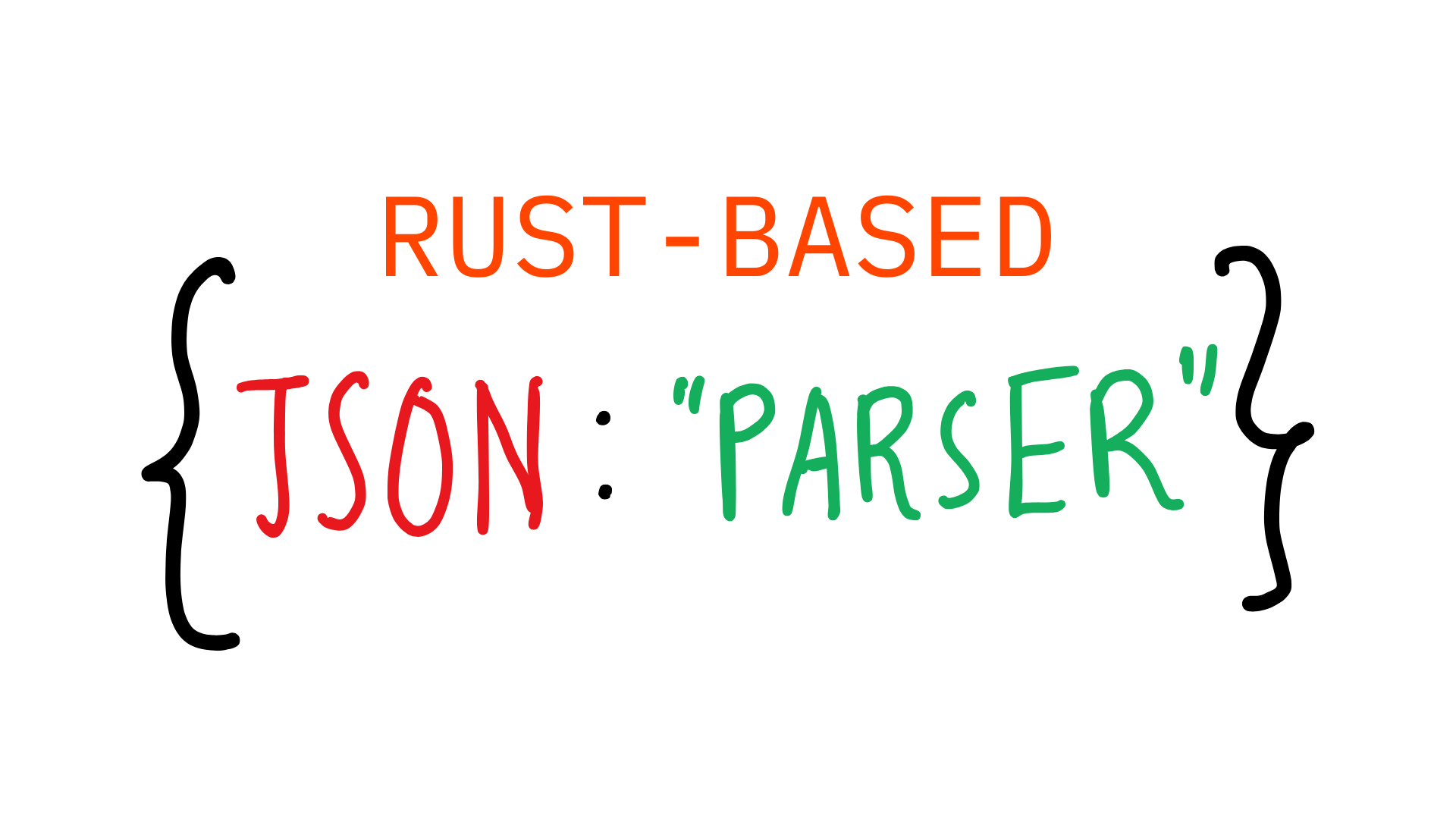Building a basic JSON parser in Rust
 Piyush Agarwal
Piyush Agarwal
JSON (JavaScript Object Notation) is a widely used data interchange format that is easy for humans to read and write. In this tutorial, we will explore how to create a basic JSON parser in Rust that will simply tell if the input string is a valid JSON or not.
JSON consists of key-value pairs, where values can be strings, numbers, objects, arrays, booleans, or null.
// Example of JSON
{
"name": "John Doe",
"age": 30,
"isStudent": false,
"grades": [90, 85, 92],
"address": {
"city": "New York",
"zipCode": "10001"
},
"isEmployed": null
}
Lexical analysis
Lexical analysis would be the first thing to undertake. It denotes splitting the string up into individual tokens.
Suppose we create an enum called token_type that informs us about the valid types a JSON can encompass.
pub enum TokenType {
// Structural Tokens
OpenBrace, // {
CloseBrace, // }
OpenBracket, // [
CloseBracket, // ]
Colon, // :
Comma, // ,
// Value Tokens
String, // "string"
Number, // 123 or 12.34
True, // true
False, // false
Null, // null
}
Now we create an enum called Token that comprises token_type and value.
pub struct Token{
pub token_type: TokenType,
pub value: String,
}
We will write a lexer() function that takes a string as input and returns a vector of Token. Let's illustrate with an example to clarify the expected output from our lexer() function.
// Example of JSON
{
"name": "John Doe",
"age": 30,
"isStudent": false,
"isEmployed": null
}
// Expected vector of tokens generated
[
Token { token_type: OpenBrace, value: "{" },
Token { token_type: String, value: "name" },
Token { token_type: Colon, value: ":" },
Token { token_type: String, value: "John Doe" },
Token { token_type: Comma, value: "," },
Token { token_type: String, value: "age" },
Token { token_type: Colon, value: ":" },
Token { token_type: Number, value: "30" },
Token { token_type: Comma, value: "," },
Token { token_type: String, value: "isStudent" },
Token { token_type: Colon, value: ":" },
Token { token_type: False, value: "false" },
Token { token_type: Comma, value: "," },
Token { token_type: String, value: "isEmployed" },
Token { token_type: Colon, value: ":" },
Token { token_type: Null, value: "null" },
Token { token_type: CloseBrace, value: "}" }
]
lexer() function for generating a vector of tokens.
pub fn lexer(json: &str) -> Vec<Token> {
let mut tokens = Vec::new();
let mut current_pointer = 0;
// Loop through the input JSON string
while current_pointer < json.len() {
// Check for opening curly brace '{'
if json.chars().nth(current_pointer) == Some('{') {
tokens.push(Token{token_type: TokenType::OpenBrace, value: String::from("{")});
current_pointer += 1;
}
// Check for closing curly brace '}'
else if json.chars().nth(current_pointer) == Some('}') {
tokens.push(Token{token_type: TokenType::CloseBrace, value: String::from("}")});
current_pointer += 1;
}
// Check for opening square bracket '['
else if json.chars().nth(current_pointer) == Some('[') {
tokens.push(Token{token_type: TokenType::OpenBracket, value: String::from("[")});
current_pointer += 1;
}
// Check for closing square bracket ']'
else if json.chars().nth(current_pointer) == Some(']') {
tokens.push(Token{token_type: TokenType::CloseBracket, value: String::from("]")});
current_pointer += 1;
}
// Check for colon ':'
else if json.chars().nth(current_pointer) == Some(':') {
tokens.push(Token{token_type: TokenType::Colon, value: String::from(":")});
current_pointer += 1;
}
// Check for comma ','
else if json.chars().nth(current_pointer) == Some(',') {
tokens.push(Token{token_type: TokenType::Comma, value: String::from(",")});
current_pointer += 1;
}
// Check for numeric values
else if json.chars().nth(current_pointer).expect("Index out of bound").is_numeric() {
let mut value = String::new();
let mut i = current_pointer;
// Collect numeric characters
while json.chars().nth(i).expect("Index out of bound").is_numeric() {
value.push(json.chars().nth(i).expect("Index out of bound"));
i += 1;
}
tokens.push(Token{token_type: TokenType::Number, value});
current_pointer = i;
}
// Check for the keyword 'true'
else if json.chars().nth(current_pointer) == Some('t') {
let mut value = String::new();
let mut i = current_pointer;
// Verify 'true' and update index
if json.chars().nth(i) == Some('t') && json.chars().nth(i+1) == Some('r') && json.chars().nth(i+2) == Some('u') && json.chars().nth(i+3) == Some('e') {
i += 4;
value = String::from("true");
}
tokens.push(Token{token_type: TokenType::True, value});
current_pointer = i;
}
// Check for the keyword 'false'
else if json.chars().nth(current_pointer) == Some('f') {
let mut value = String::new();
let mut i = current_pointer;
// Verify 'false' and update index
if json.chars().nth(i) == Some('f') && json.chars().nth(i+1) == Some('a') && json.chars().nth(i+2) == Some('l') && json.chars().nth(i+3) == Some('s') && json.chars().nth(i+4) == Some('e') {
i += 5;
value = String::from("false");
}
tokens.push(Token{token_type: TokenType::False, value});
current_pointer = i;
}
// Check for the keyword 'null'
else if json.chars().nth(current_pointer) == Some('n') {
let mut value = String::new();
let mut i = current_pointer;
// Verify 'null' and update index
if json.chars().nth(i) == Some('n') && json.chars().nth(i+1) == Some('u') && json.chars().nth(i+2) == Some('l') && json.chars().nth(i+3) == Some('l') {
i += 4;
value = String::from("null");
}
tokens.push(Token{token_type: TokenType::Null, value});
current_pointer = i;
}
// Check for double quotes indicating the start of a string
else if json.chars().nth(current_pointer) == Some('"') {
let mut value = String::new();
let mut i = current_pointer + 1;
// Collect characters until the closing double quote
while json.chars().nth(i) != Some('"') {
value.push(json.chars().nth(i).expect("Index out of bound"));
i += 1;
}
tokens.push(Token{token_type: TokenType::String, value});
current_pointer = i + 1;
}
// Ignore whitespace characters
else if json.chars().nth(current_pointer) == Some(' ') || json.chars().nth(current_pointer) == Some('\n') || json.chars().nth(current_pointer) == Some('\t'){
current_pointer += 1;
}
// If the character is not a valid JSON token, return an empty vector
else {
return Vec::new();
}
}
tokens // Return the tokens vector
}
Parsing
Parsing JSON values
Once we have tokens, the next step is to parse the JSON values. In Rust, we use a recursive descent parser, which starts from the top level and recursively parses nested structures. We create a
parse_valuefunction to handle different types of JSON values: strings, numbers, booleans, null, objects, and arrays.// Function to parse individual values or in our case individual tokens pub fn parse_value(tokens : &Vec<Token>, current_pointer : &mut usize) -> bool{ let token = &tokens[*current_pointer]; if token.token_type == TokenType::String { true } else if token.token_type == TokenType::Number { true } else if token.token_type == TokenType::True { true } else if token.token_type == TokenType::False { true } else if token.token_type == TokenType::Null { true } else if token.token_type == TokenType::OpenBrace { parse_object(tokens, current_pointer) } else if token.token_type == TokenType::OpenBracket { parse_array(tokens, current_pointer) } else{ false } }Parsing JSON Objects
Objects in JSON are key-value pairs enclosed in curly braces. We create a
parse_objectfunction to handle the parsing of JSON objects. It ensures that each key is a string followed by a colon and a valid value. The function also handles commas between key-value pairs and checks for proper closure with a closing brace.// Fuction to parse and check if the object is valid pub fn parse_object(tokens : &Vec<Token>, current_pointer : &mut usize) -> bool{ *current_pointer += 1; // Skip the open brace while *current_pointer < tokens.len() && tokens[*current_pointer].token_type != TokenType::CloseBrace{ if tokens[*current_pointer].token_type != TokenType::String{ return false; // Key is not in the form of a string } *current_pointer += 1; // Skip the key if tokens[*current_pointer].token_type != TokenType::Colon{ return false; // Key is not followed by a colon } *current_pointer += 1; // Skip the colon if !parse_value(tokens, current_pointer){ return false; } *current_pointer += 1; // Skip the value // If the next token is a comma and after the comma there is closing brace, return false (e.g. {"key": "value",}) if *current_pointer < tokens.len() && tokens[*current_pointer].token_type == TokenType::Comma && tokens[*current_pointer + 1].token_type == TokenType::CloseBrace{ return false; } // If the next token is a comma, skip it if *current_pointer < tokens.len() && tokens[*current_pointer].token_type == TokenType::Comma{ *current_pointer += 1; // Skip the comma } } if *current_pointer < tokens.len() && tokens[*current_pointer].token_type != TokenType::CloseBrace{ return false; // If the object is not closed } *current_pointer += 1; // Skip the closing brace true // If the object is valid and current_pointer is at the closing brace }Parsing JSON arrays
Arrays in JSON are ordered lists of values enclosed in square brackets. We create a
parse_arrayfunction to handle the parsing of JSON arrays. Similar to parsing objects, this function ensures valid values, handles commas between elements, and checks for proper closure with a closing bracket.// Fuction to parse and check if the array is valid pub fn parse_array(tokens : &Vec<Token>, current_pointer : &mut usize) -> bool{ *current_pointer += 1; // Skip the open bracket while *current_pointer < tokens.len() && tokens[*current_pointer].token_type != TokenType::CloseBracket{ if !parse_value(tokens, current_pointer){ return false; } *current_pointer += 1; // Skip the value // If the next token is a comma and after the comma there is closing bracket, return false (e.g. ["value",]) if *current_pointer < tokens.len() && tokens[*current_pointer].token_type == TokenType::Comma && tokens[*current_pointer + 1].token_type == TokenType::CloseBracket{ return false; } // If the next token is a comma, skip it if *current_pointer < tokens.len() && tokens[*current_pointer].token_type == TokenType::Comma{ *current_pointer += 1; // Skip the comma } } if *current_pointer < tokens.len() && tokens[*current_pointer].token_type != TokenType::CloseBracket{ return false; // If the array is not closed } // If the json consists only array if *current_pointer == &tokens.len() - 1 { *current_pointer += 1; } true // If the array is valid }Putting all together
Finally, we combine the lexer and parser functions to create a complete JSON parser. The
parsefunction takes a vector of tokens and verifies whether the input string adheres to valid JSON syntax.// Function to parse the tokens vector and check if the JSON is valid pub fn parse(tokens: &Vec<Token>) -> bool { // Check if the tokens vector is empty if tokens.len() == 0 { // If the JSON is empty, return false return false; } let mut current_pointer = 0; // Call the recursive parse_value function to start parsing the JSON let result = parse_value(&tokens, &mut current_pointer); // Return true if parsing is successful and the entire tokens vector is consumed result && current_pointer == tokens.len() }
For a detailed walkthrough and the complete Rust code, you can refer to this GitHub repository.
Conclusion
Building a JSON parser involves breaking down the task into smaller steps: tokenizing the input string, parsing different types of values, handling objects and arrays, and ensuring proper closure.
Happy coding!
Subscribe to my newsletter
Read articles from Piyush Agarwal directly inside your inbox. Subscribe to the newsletter, and don't miss out.
Written by

Piyush Agarwal
Piyush Agarwal
I am a full stack developer with a passion for learning and exploring new technologies. As a developer, I stay up-to-date with the latest advancements in the tech world and am always eager to experiment with new tools and frameworks.